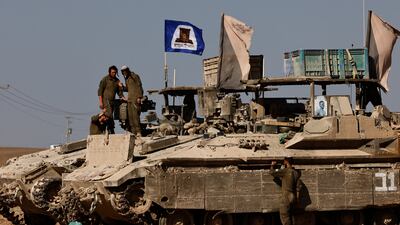The Israeli military said it issued about 60,000 reserve orders on Wednesday, before a planned offensive against Hamas in Gaza city.
In addition, 20,000 reservists already called up will receive a notice extending their current orders.
The moves followed “in-depth discussions on the extent of manpower required for the continuation of combat”, the military said.
The mobilisation comes after Israeli Defence Minister Israel Katz approved the military's plans to seize Gaza city. It remains unclear when the operation will begin, but it could be a matter of days.
The offensive, announced this month, has heightened international condemnation of Israel and fuelled fears of another mass displacement of Palestinians.
Israeli Prime Minister Benjamin Netanyahu said on August 9 that the military's expanded offensive would cover parts of Gaza city and central areas of the coastal strip.
Hundreds of thousands of displaced people are sheltering in the city and it holds some of the last remnants of critical infrastructure.
Human rights groups and most of Israel's western allies have warned that the new offensive would worsen the humanitarian crisis in Gaza, where most residents have been displaced, vast neighbourhoods lie in ruins, and communities are facing the threat of famine as a result of restrictions on the entry of aid.
French President Emmanuel Macron said on Wednesday that the planned offensive “can only lead to disaster for both peoples and risks plunging the entire region into a cycle of permanent war”.
The German government said it “rejects the escalation” of Israel's campaign. Germany finds it “increasingly difficult to understand how these actions will lead to the freeing of all the hostages, or to a ceasefire,” government spokesman Steffen Meyer told reporters.
Mediators and Hamas both said this week that the militant group had agreed to a 60-day ceasefire proposal, though similar announcements have been made in the past that did not lead to a halt in fighting.
The group said its main proposed amendment to the latest plan is for Israeli troops to withdraw more than 800 metres from residential areas in Gaza.
Israel has yet to formally respond to the ceasefire proposal put forward by Qatar and Egypt. However, it has demanded the release of all 50 hostages held in the Palestinian territory at once, contrary to the current plan for a phased release, and dimming hopes of a last-ditch truce.
Qatar on Tuesday urged Israel to accept a truce to avert a “humanitarian catastrophe” in the strip.
Mr Netanyahu has repeatedly said he will oppose a deal that does not include the “complete defeat of Hamas”.
More than 62,000 people have been killed during Israel's 22-month offensive in Gaza, according to the enclave's health ministry. It said that at least 269 people, including 112 children, have died of malnutrition-related causes during the conflict.
Israel says it wants to ensure there cannot be a repeat of the Hamas-led attack on October 7, 2023, when militants from Gaza killed about 1,200 people and took about 250 hostages in raids on southern Israel. The attack resulted in Israel's military offensive in Gaza as well as increasingly hostile policies against Palestinians in the occupied West Bank.
West Bank expansion
Israel gave final approval on Wednesday for a settlement project in the West Bank that would effectively cut the territory in two, further undermining hopes for a future Palestinian state.
Settlement development in E1, an open tract of land east of Jerusalem, has been under consideration for more than two decades, but was frozen due to US pressure during previous administrations.
The international community overwhelmingly considers the construction of Israeli settlements in the occupied West Bank to be illegal and an obstacle to peace.
Far-right Finance Minister Bezalel Smotrich, a former settler leader, cast the approval as a rebuke to western countries that have announced plans to recognise a Palestinian state in recent weeks.
“The Palestinian state is being erased from the table not with slogans but with actions,” Mr Smotrich said. “Every settlement, every neighbourhood, every housing unit is another nail in the coffin of this dangerous idea.”
Mr Netanyahu rejects the idea of a Palestinian state alongside Israel and has vowed to maintain open-ended control over the West Bank, annexed East Jerusalem and the war-ravaged Gaza Strip – territories Israel seized in the 1967 war that the Palestinians want for their state.
Israel’s expansion of settlements is part of an increasingly dire reality for West Bank Palestinians as the world’s attention focuses on the war in Gaza.
Palestinians in the West Bank have faced a marked increase in attacks by settlers, evictions, Israeli military operations and checkpoints that choke freedom of movement. There have also been several Palestinian attacks on Israelis.
More than 700,000 Israeli settlers live in the West Bank and East Jerusalem.


